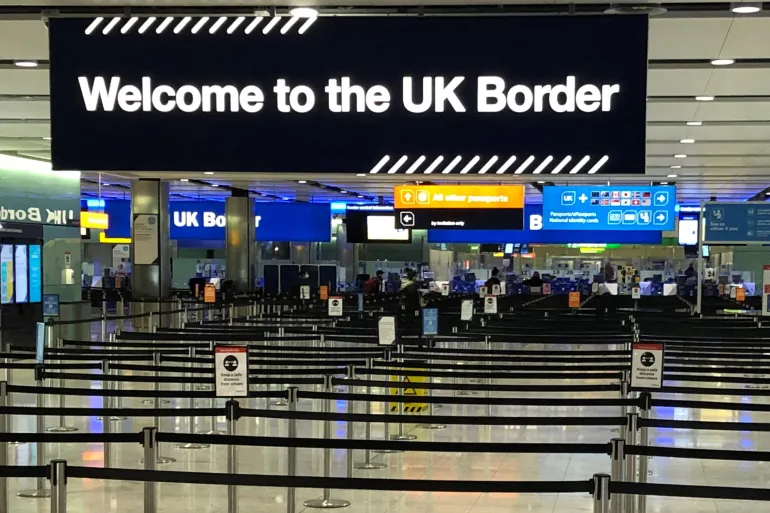The United Kingdom on Monday released its long-awaited Immigration White Paper, setting out a stricter framework to reduce net migration, raise skill thresholds, and curb abuse of the system.
The 82-page document, titled Restoring Control over the Immigration System, outlines wide-ranging changes across work, study, family and asylum routes.
A Strategy to “Take Back Control”
Prime Minister Keir Starmer, speaking ahead of the paper’s release, said, “Today, we publish a white paper on immigration, a strategy absolutely central to my plan for change that will finally take back control of our borders and close the book on a squalid chapter for our politics, our economy and our country.”
He criticized the former government for its failure to reduce migration levels. “Between 2019 and 2023, even as they were going round our country telling people with a straight face that they would get immigration down, net migration quadrupled, until in 2023 it reached nearly 1 million. That’s about the population of Birmingham. That’s not control. It’s chaos,” said Starmer.
Figures from the Office for National Statistics show that net migration rose from 224,000 in the year to June 2019 to 906,000 in the year ending June 2023.
Major Policy Changes in the White Paper
Key measures proposed in the paper include:
- Raising the skilled worker threshold to RQF 6 (equivalent to degree level)
- Removing the Immigration Salary List, which allowed lower pay for certain roles
- Limiting access to the points-based system to occupations with long-term shortages and workforce strategies
“Measures unveiled in the Immigration White Paper will reshape our immigration system towards those who contribute most to economic growth, with higher skills standards for graduates and workers,” the UK Home Office said in a release accessed by Business Standard.
Domestic Training and Labor Market Reform
Employers will be required to increase domestic training. “New requirements on employers to boost domestic training will end the reliance on international recruitment, restoring order to a failed system that saw net migration quadruple between 2019 and 2023,” the Home Office added.
A new Labor Market Evidence Group will be formed to assess workforce needs based on data, not migration. Sector bodies will be consulted in the process.
In a significant move, the government will end new international recruitment for adult social care visas. However, existing visa holders already in the UK will be allowed to extend or switch visas domestically until 2028 during a transition period. The policy will remain under review while a broader social care workforce plan is developed.
Changes to Student Visas and Education Compliance
- Stricter compliance rules for education providers will be introduced, with action plans and recruitment caps for underperforming sponsors.
- The post-study stay period for graduates will be reduced from two years to 18 months.
Family, Deportation, and Article 8 Reform
The government plans to simplify family and private life immigration rules and restrict the use of Article 8 rights to block deportations. A new legal framework will clarify that Parliament decides who may remain in the UK.
The Home Office will also revise deportation criteria for foreign national offenders to include all convictions, not just prison sentences. Statutory exceptions will be updated to reflect the seriousness of crimes such as violence against women and girls.
Tackling System Abuse
New visa controls, restrictions, and sanctions will be imposed on countries that repeatedly abuse the UK’s immigration system. Asylum seekers whose country conditions have not changed significantly may face new limits, especially those applying after arrival.
Sponsors of migrant workers and students who break the rules may face financial penalties or sanctions.
Longer Settlement Pathway and Citizenship Changes
- The qualifying period for settlement will be doubled to 10 years
- The points-based system will be extended to settlement and citizenship applications, with full details expected in Parliament later this year
English Language and Global Talent Routes
New English language requirements will be introduced across more immigration categories, covering both primary applicants and dependants. Applicants may also be assessed for improvement in language over time.
While tightening general immigration routes, the government plans to expand access for highly skilled individuals, including:
- Increasing placements under the research interns scheme
- Easing access to the Global Talent visa
- Reviewing the Innovator Founder and High Potential Individual visas
Faster entry will be considered for roles in strategic sectors such as science and technology.
A Decisive Shift
Starmer said the white paper marks a decisive break from the system inherited from the previous government. “This plan means migration will fall,” he said, adding that the notion that high migration guarantees high growth had failed to deliver.
“You can’t simply pull up a drawbridge… but we do have to ask why parts of our economy seem almost addicted to importing cheap labor rather than investing in the skills of people who are here and want a good job,” said Starmer.
Further reforms to asylum and border control are expected later this summer, in line with the Border Security, Asylum and Immigration Bill now moving through Parliament.






